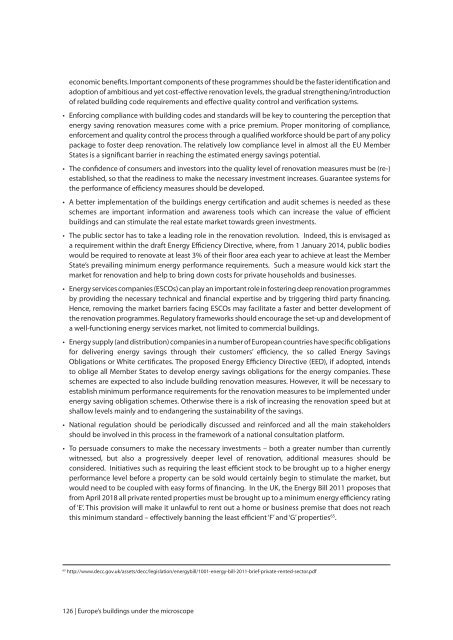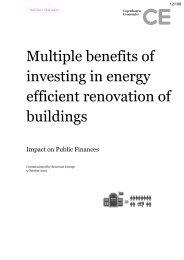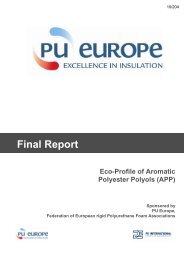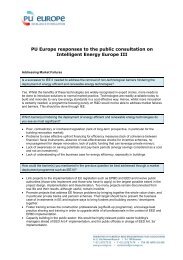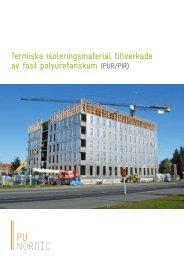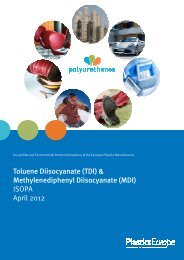BPIE: Europe's buildings under the microscope - PU Europe
BPIE: Europe's buildings under the microscope - PU Europe
BPIE: Europe's buildings under the microscope - PU Europe
Create successful ePaper yourself
Turn your PDF publications into a flip-book with our unique Google optimized e-Paper software.
economic benefits. Important components of <strong>the</strong>se programmes should be <strong>the</strong> faster identification and<br />
adoption of ambitious and yet cost-effective renovation levels, <strong>the</strong> gradual streng<strong>the</strong>ning/introduction<br />
of related building code requirements and effective quality control and verification systems.<br />
• Enforcing compliance with building codes and standards will be key to countering <strong>the</strong> perception that<br />
energy saving renovation measures come with a price premium. Proper monitoring of compliance,<br />
enforcement and quality control <strong>the</strong> process through a qualified workforce should be part of any policy<br />
package to foster deep renovation. The relatively low compliance level in almost all <strong>the</strong> EU Member<br />
States is a significant barrier in reaching <strong>the</strong> estimated energy savings potential.<br />
• The confidence of consumers and investors into <strong>the</strong> quality level of renovation measures must be (re-)<br />
established, so that <strong>the</strong> readiness to make <strong>the</strong> necessary investment increases. Guarantee systems for<br />
<strong>the</strong> performance of efficiency measures should be developed.<br />
• A better implementation of <strong>the</strong> <strong>buildings</strong> energy certification and audit schemes is needed as <strong>the</strong>se<br />
schemes are important information and awareness tools which can increase <strong>the</strong> value of efficient<br />
<strong>buildings</strong> and can stimulate <strong>the</strong> real estate market towards green investments.<br />
• The public sector has to take a leading role in <strong>the</strong> renovation revolution. Indeed, this is envisaged as<br />
a requirement within <strong>the</strong> draft Energy Efficiency Directive, where, from 1 January 2014, public bodies<br />
would be required to renovate at least 3% of <strong>the</strong>ir floor area each year to achieve at least <strong>the</strong> Member<br />
State’s prevailing minimum energy performance requirements. Such a measure would kick start <strong>the</strong><br />
market for renovation and help to bring down costs for private households and businesses.<br />
• Energy services companies (ESCOs) can play an important role in fostering deep renovation programmes<br />
by providing <strong>the</strong> necessary technical and financial expertise and by triggering third party financing.<br />
Hence, removing <strong>the</strong> market barriers facing ESCOs may facilitate a faster and better development of<br />
<strong>the</strong> renovation programmes. Regulatory frameworks should encourage <strong>the</strong> set-up and development of<br />
a well-functioning energy services market, not limited to commercial <strong>buildings</strong>.<br />
• Energy supply (and distribution) companies in a number of <strong>Europe</strong>an countries have specific obligations<br />
for delivering energy savings through <strong>the</strong>ir customers’ efficiency, <strong>the</strong> so called Energy Savings<br />
Obligations or White certificates. The proposed Energy Efficiency Directive (EED), if adopted, intends<br />
to oblige all Member States to develop energy savings obligations for <strong>the</strong> energy companies. These<br />
schemes are expected to also include building renovation measures. However, it will be necessary to<br />
establish minimum performance requirements for <strong>the</strong> renovation measures to be implemented <strong>under</strong><br />
energy saving obligation schemes. O<strong>the</strong>rwise <strong>the</strong>re is a risk of increasing <strong>the</strong> renovation speed but at<br />
shallow levels mainly and to endangering <strong>the</strong> sustainability of <strong>the</strong> savings.<br />
• National regulation should be periodically discussed and reinforced and all <strong>the</strong> main stakeholders<br />
should be involved in this process in <strong>the</strong> framework of a national consultation platform.<br />
• To persuade consumers to make <strong>the</strong> necessary investments – both a greater number than currently<br />
witnessed, but also a progressively deeper level of renovation, additional measures should be<br />
considered. Initiatives such as requiring <strong>the</strong> least efficient stock to be brought up to a higher energy<br />
performance level before a property can be sold would certainly begin to stimulate <strong>the</strong> market, but<br />
would need to be coupled with easy forms of financing. In <strong>the</strong> UK, <strong>the</strong> Energy Bill 2011 proposes that<br />
from April 2018 all private rented properties must be brought up to a minimum energy efficiency rating<br />
of ‘E’. This provision will make it unlawful to rent out a home or business premise that does not reach<br />
this minimum standard – effectively banning <strong>the</strong> least efficient ‘F’ and ‘G’ properties 65 .<br />
65<br />
http://www.decc.gov.uk/assets/decc/legislation/energybill/1001-energy-bill-2011-brief-private-rented-sector.pdf<br />
126 | <strong>Europe</strong>’s <strong>buildings</strong> <strong>under</strong> <strong>the</strong> <strong>microscope</strong>


